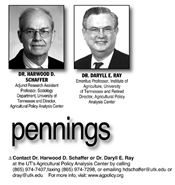|
Sanders Proposes Fundamental Changes In Agricultural And Rural Policies

In an era of low agricultural commodity prices plus the history of the Democratic Party and the approach to agricultural policy that it developed during the Great Depression, it should come as no surprise that two of the leading candidates for the Democratic nomination for President have come out in favor of supply management programs for agriculture.
This policy design was first developed by Henry Agard Wallace, Secretary of Agriculture under Franklin Delano Roosevelt to respond to the long period of low prices that farmers faced between the end of WWI and the early years of the Great Depression. By the time FDR was inaugurated in early 1933, farmers were desperate. In response to unrest in farm areas, Wallace and his colleagues developed the basic structure of the supply management program that was at the heart of the Agricultural Adjustment Act of 1933 and is enshrined in the agricultural legislation referred to as “permanent law.”
Senator Bernie Sanders places himself squarely in this tradition with a policy paper called “Revitalizing Rural America” (https://tinyurl.com/y3xsbyqx). Sanders writes, “Fundamental change in America’s agricultural and rural policies is no longer just an option; it’s an absolute necessity. With the right support and policies, we can have rural communities that are thriving economically and ecologically.”
Sanders says he will “enact supply management programs to prevent shortages and surpluses to ensure farmers make a living wage and ensure consumers receive a high-quality, stable, and secure supply of agricultural goods.” He calls for “setting price floors and matching supply with demand so farmers are guaranteed the cost of production and family living expenses.” He also calls for addressing farm bankruptcies, a growing problem as we go into the sixth year of falling farm prices and income.
He sees “food security as a national security issue” writing, “We need trade policies that safeguard food security at home and around the globe. Over 800 million people worldwide are affected by undernourishment or food deprivation, including millions of small farmers threatened by climate change, volatile prices, and unfair trade practices.” Sanders goes on to link food insecurity in East Africa, South Sudan, and Yemen with the armed conflicts going on in those countries.
Sanders’ policy proposal addresses a complaint that we have heard from farmers who want to be able to repair or modify their own equipment, by advocating for a change in law that would give farmers “full rights over the machinery they buy.”
In the years since the change in Medicare reimbursement rules under Reagan, rural health care facilities have been under increasing financial pressure and their numbers have significantly declined. Sanders proposes to “provide funding to rebuild and expand rural health care infrastructure, including hospitals, maternity wards, mental health clinics, dental clinics, dialysis centers, home care services, ambulance services, and emergency departments in rural areas.”
As we wrote last year, “as of 2009, 15 percent of US counties were without a single hospital or a surgeon. Another 15 percent had a hospital but no surgeon. Since 2010, 80 rural hospitals have closed. In addition, 54 percent of rural counties are without hospital-based obstetric services” (https://tinyurl.com/y6ygr2yg).
He also addresses “distressed rural communities that have high levels of poverty.” Sanders writes, “When we are in White House, we will take Rep. Jim Clyburn’s 10-20-30 approach to federal investments. Under this plan, at least 10 percent of funding for any program would need to go to counties where at least 20 percent of the population has lived below the federal poverty level for at least 30 years. These nearly 500 counties span the rural and racial divide, including majority black counties in the deep South, predominantly Hispanic counties in the Southwest, Native American communities in the West, and largely white counties in Appalachia. As much as 80 percent of the counties targeted by the policy can be defined as rural.”
Compared to the perception that rural areas are “flyover country,” Sanders’ approach to rural and agricultural policy are refreshingly comprehensive.” ∆
DR. HARWOOD D. SCHAFFER: Adjunct Research Assistant Professor, Sociology Department, University of Tennessee and Director, Agricultural Policy Analysis Center
DR. DARYLL E. RAY: Emeritus Professor, Institute of Agriculture, University of Tennessee and Retired Director, Agricultural Policy Analysis Center
|
|